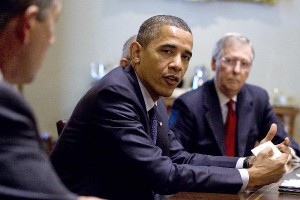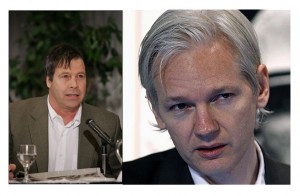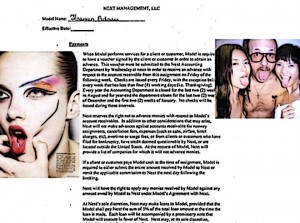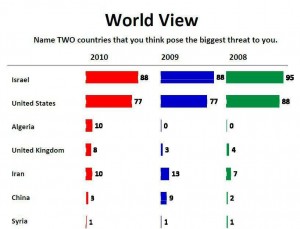Bustelo coffee can housing connected extension cords. Practical, and festive!
Submitted for consideration for 2011 MacArthur Fellowship.
ineffable beauty, unspeakable evil, etc
Trying to catch up on the myriad “Best Of” lists for 2010. I’ve found at least one silver lining from this sustained, soul-crushing recession: There are a lot of smart, tasteful people who stay at home listening to music a lot, and writing about it on their blogs.
My favorite source for the past three or four months has been Music For Ants . They do lovely mp3 mixes, some seasonal, others thematic (one dedicated to the iconic Boom! Boom boom, cha! drumbeat). They are terrific curators, amateurs in the good, French sense of the word. And they are apparently heavily into a Zoolander cult of some sort. Which is also good.
Below, a video from Phantogram, a duo based in Saratoga Springs, New York, one of the many revelations from Music For Ants’ 50 Songs for 2010 list.
Jay Rosen’s From Judith Miller to Julian Assange pinpoints when the Paper of Record switched its mission statement–from reporting the news to parroting the government line, without skepticism, without verification.
For the American press that still looks to Watergate and the Pentagon Papers for inspiration, and that considers itself a check on state power, the hour of its greatest humiliation can, I think, be identified with some precision: it was on Sunday, September 8, 2002.
On that morning the New York Times published a now notorious story, reported by Michael R. Gordon and Judith Miller, in which nameless Bush Administration officials claimed that Iraq was trying to buy the kind of aluminum tubes necessary to build a nuclear centrifuge.
Rosen weaves in material from “Now they tell us,” Michael Massing’s 2004 analysis of “the nadir” (Rosen’s phrase) in the New York Review of Books, to demonstrate just how momentous that Sunday morning was:
We know from retrospective accounts that the Bush White House had already decided to go to war. We know from the Downing Street Memo that “the intelligence and facts were being fixed around the policy.” We know that the Bush forces had decided to rev up their sales campaign that week because ”from a marketing point of view you don’t introduce new products in August,” as chief of staff Andrew Card brazenly put it. We know that the appearance of the tubes story in the Times is what allowed Cheney, Powell, Rumsfeld and Rice to run with it on the Sunday shows, because without that they would have been divulging classified information and flouting their own rules. We also know that the tubes story was wrong: they weren’t for centrifuges. And yet it was coming from the very top of the professional pyramid, the New York Times.
.. The government had closed circle on the press, laundering its own manipulated intelligence through the by-lines of two experienced reporters, smuggling the deed past layers of editors, and then marching it like a trained dog onto the Sunday talk shows to perform in a lurid doomsday act.
.
In retrospect, it looks awfully bad, but it’s significant that the Times has put a lot of effort into examining its own behavior, and is only a little bit sorry.
Below, a 14-minute video in which Rosen expands on the print piece (nice title, btw):
As for the events of the past two weeks, it appears the Times fancies it’s doing something qualitatively different from what the government is going after Assange for. Not everyone agrees. The ubiquitous and odious Joe Lieberman has already floated the idea of prosecuting the Times:
“I’m not here to make a final judgment on that, but to me the New York Times has committed at least an act of bad citizenship,” he said. “Whether they’ve committed a crime, I think that bears a very intensive inquiry by the Justice Department.”
In contrast to the Times’ obliviousness, the Guardian’s Friday editorial recognizes the stakes. Although the focus here is on a free Internet, the bottom line for a nominally democratic society is the same.
In times when big business and governments attempt to monitor and control everything, there is a need as never before for an internet that remains a free and universal form of communication. WikiLeaks’ chief crime has been to speak truth to power. What is at stake is nothing less than the freedom of the internet. All the rest is a sideshow distracting attention from the real battle that is being fought. We should all keep focus on the true target.
Rosen makes the connection in his conclusion, quoting Guardian columnist Simon Jenkins, a Brit who evokes high (and apparently bygone) American standards of governance and transparency:
“Accountability can only default to disclosure. As Jefferson remarked, the press is the last best hope when democratic oversight fails.” But at the nadir the last best hope failed, too. When that happens accountability defaults to extreme disclosure, which is where we are today. The institutional press isn’t driving it; the wilds of the Internet are. To understand Julian Assange and the weird reactions to him in the American press we need to tell a story that starts with Judy Miller and ends with Wikileaks

From the New York Times this morning:
From Nobody represents the American people by Michael Lind, in Salon:
The basic outlines of American economic policy and foreign policy remain the same, even as Congress and the White House change hands. The changes promised by progressive Democrats and Tea Party Republicans are quickly discarded after the elections.
The changes that do take place are often the opposite of those that majorities of Americans want. Most Americans want Social Security to be strengthened and American manufacturing protected. But the conversation among elites inside the Beltway-New York bubble is about cutting Social Security and more one-sided “free trade” deals with mercantilist nations that, unlike the U.S., protect and promote their domestic industries.
Many Americans have come to the conclusion that nobody represents them in Washington anymore. They are right.
PS And on that one tiny sliver of something that might, in a pinch, be called progressive, the “extension” of unemployment benefits, another case of false, or at least deceptive advertising:
Just to be clear, the “extension of the unemployment benefits” is an extension of the qualifying dates for the various tiers of benefits, and not additional weeks of benefits. There is no additional help for the so-called “99ers”.
You’re welcome. And Merry Christmas.
“Bonjour, mon petit bureau de change.”

Don’t get me wrong. I LOVED Jack Shafer’s Slate piece, “Why I Love WikiLeaks: For restoring distrust in our most important institutions”, and this may be a quibble … but there’s an obiter dictum that screams out for comment:
Oh, sure, he’s a pompous egomaniac sporting a series of bad haircuts and grandiose tendencies.
Juilan Assange has a lot on his plate, including a warrant for his arrest and calls for his assassination (actual crimes, by the way)–from that Canadian oaf (“feeling manly today”) and others, so let’s not make him all anxious about his hair.
It could be that this is an old picture of Mr. Shafer, and he now sports a new, more stylish coif. Or maybe Google Images has led me astray, and that isn’t even a picture of Jack Shafer. In either case, my apologies.
But otherwise … something something … glass houses … shouldn’t throw stones.
I like to think that I’m up to speed on the subject of Iran’s purported nuclear program, but this RealNews Network interview with former CIA analyst Ray McGovern serves up some surprising news.
It was surprising to me, anyway, because I wouldn’t be caught dead reading the new Dubya bio, but McGovern did. Apparently even purchased the damn thing.
This entire interview is excellent. The avuncular McGovern stomps all over the Times’ ham-handed and just flat out wrong attempt to claim (over four pages in the print edition) the Iran/Saudi princes wikileak as support for their hysteria over the “sharp distress over a nuclear Iran.”
This in spite of the fact that the last word continues to be the 2007 NIE in which, as McGovern says, “sixteen intelligence agencies declared with great confidence that in 2003 Iran halted its nuclear weapons program.”
The part that surprised me was what McGovern pulled from the pages of Decision Points, Dubya’s bio (at 6:25 or so): that the young Bush threw an absolute hissy about the NIE when it came out, and promptly flew to Israel and Saudi Arabia to apologize!
Why apologize? (one might well ask). Isn’t this good news? Not for the Decider.
Ah, that explains all too well.
Oh, and as for an updated NIE, McGovern says Don’t hold your breath:
Also, an updated NIE on Iran’s nuclear program, completed earlier this year, is dead in its tracks, apparently because anti-Iran hawks inside the Obama administration are afraid it will leak. It is said to repeat pretty much the conclusions of the NIE from 2007.

It doesn’t compare with the uncovering of 15,000 Iraqi corpses no one had previously acknowledged (but that is not exactly a trending Twitter topic today, is it?) Still, there are some eye-opening revelations contained in “What Vogue really pays its models”.
I harbor no illusions about the fashion industry (two words: Terry Richardson!), but I was actually kind of shocked by Jenna Sauers’ examination of the numbers and arrangements brought to light by the $3.75 million lawsuit filed by three eastern European models against the Next Agency.
Really, the day rate for “new faces” at Vogue is $125. And for “established models” $250!
Although that is pretty hard to square with the only model quote most people remember (“We don’t wake up for less than ten thousand dollars a day”), apparently the editorial pay rate is hardly a secret.
BUT, in at least one model’s case, those modest fees still hadn’t been paid nearly a year after being incurred. And after looking over the contracts, you could make the case that the agency in question, which is supposed to work on behalf of the models, offers something like indentured servitude for all but a few of them.
The piece is funny/shocking, a perfect balance of outrage/bemusement (the author, Jenna Sauers, is a former model). The myriad ways agencies take advantage of their clients (typically teenagers, frequently girls with little or no English) is dizzying, to say the least.
A brief excerpt, and Sauers’ conclusion:
Next also includes in its standard contract a provision that it be permitted to keep up to $5,000 of a model’s earnings in what it calls a “Reserve Account,” just in case Next incurs any expenses on the model’s behalf at some time in the future. Pedaru isn’t subject to this clause — it’s crossed out. But in its standard form, this contract binds a model to a management agency that will first take 20% of everything that she earns, then take a bite out of the rest for miscellaneous expenses that it need not inform the model of beforehand or seek her permission for, a management company that may book her on jobs for clients that have a record of non-payment at her sole risk, and then, if she’s still in the black after all that — and a lot of newer models, especially those on the hook for the travel costs booked by the agency, and the rent at the models’ apartment the agency owns, and the grocery and phone bill money they have to borrow against their future earnings (at a 5% penalty) which agencies call “pocket money,” are most assuredly not in the black after the above calculations — if that model is in the black after all that, the first $5,000 left over is the agency’s to hold on to. Just in case. Pedaru was three months shy of her 16th birthday when she signed her contract with Next.
The lessons here? Vogue Paris pays crap, Vogue pays not much better, neither of them pays particularly quickly, and campaigns are worth a mint to everyone lucky enough to work on them. And if you are a 5’10” 15-year-old with 34″ hips who would like a job where you’ll bear all the market risks associated with your labor, be solely responsible for expenses outlayed by others on your behalf without your consent, and maybe meet nice, successful men like Terry Richardson, modeling might just be the ticket.

I think I gave too much credit in the previous post to the dubious notion, advanced by the Times and others, that the cables vindicate U.S. and Israeli hawkishness vis à vis Iran.
I should have just cut to the chase, as Mr. Chomsky did on Democracy Now yesterday. The dictators think one thing, and their subjects think the opposite.
So Hillary Clinton and Benjamin Netanyahu surely know of the careful polls of Arab public opinion. The Brookings Institute just a few months ago released extensive polls of what Arabs think about Iran. The results are rather striking. They show the Arab opinion holds that the major threat in the region is Israel- that’s 80. The second major threat is the United States- that’s 77. Iran is listed as a threat by 10%.
With regard to nuclear weapons, rather remarkably, a majority- in fact, 57–say that the region would have a positive effect in the region if Iran had nuclear weapons. Now, these are not small numbers. 80, 77, say the U.S. and Israel are the major threat. 10 say Iran is the major threat. This may not be reported in the newspapers here- it is in England- but it’s certainly familiar to the Israeli and U.S. governments, and to the ambassadors. But there is not a word about it anywhere. What that reveals is the profound hatred for democracy on the part of our political leadership and the Israeli political leadership. These things aren’t even to be mentioned. This seeps its way all through the diplomatic service. The cables to not have any indication of that.
When they talk about Arabs, they mean the Arab dictators, not the population, which is overwhelmingly opposed to the conclusions that the analysts here- Clinton and the media- have drawn.
Here is the summary of the poll results.
And Chomsky’s larger point? That “what this reveals is the profound hatred for democracy on the part of our political leadership”? Can’t really disagree.
That should be paired with Jack Shafer’s sharp observation in Slate yesterday:
International scandals—such as the one precipitated by this week’s WikiLeaks cable dump—serve us by illustrating how our governments work. Better than any civics textbook, revisionist history, political speech, bumper sticker, or five-part investigative series, an international scandal unmasks presidents and kings, military commanders and buck privates, cabinet secretaries and diplomats, corporate leaders and bankers, and arms-makers and arms-merchants as the bunglers, liars, and double-dealers they are.
The Pentagon Papers are a thing of the distant past, and the New York Times isn’t exactly giving Julian Assange the Ellsberg treatment. In fact, it gave its war-adoring soldier fanboy reporter the assignment of penning a hatchet job on Assange.
Still, the Times was on board (sort of, and selectively) with the latest wikileaks release, tens of thousands of cables showing the U.S. government in a most unflattering light. To my eyes, the most newsworthy were the ones where Hillary signed off on outright spying on diplomats from other countries, including the secretary general of the UN. Credit card numbers! DNA samples! Oh my God! How low can you go? “Mr. Secretary General, I notice a stray gray hair there. One sec, I’ll just … Got it! See, that didn’t hurt, did it? Uh, no, I’ll just put it in this little plastic pouch for safekeeping…..”
Pretty shocking, right?
For the Times, not nearly as important as … drum roll, please … what the cables revealed about What a Major Threat Iran Represents! Especially now that we know Arab princes don’t like the Persians, and are afraid of them, and want America to stop them in their phantom nuclear weapon-making.
Three reporters cobbled together a compendium of Iran Threat-related snippets, and wove a narrative about just how hard it has been to convince the Russians and the Chinese and Italians to isolate and confront Iran–in the Tom Clancy-worthy phrase, to “cut off the head of the snake.”
That last quote was from King Abdullah of Saudi Arabia, who has a very low opinion of Iran, for reasons the Times doesn’t quite spell out.
To its credit, the Times does actually use the phrase “Arab obsession with Iran” and briefly mentions “the uneasy sectarian division of the Muslim world, between the Shiites who rule Iran, and the Sunnis, who dominate most of the region,” but in general takes the worries of the corrupt Gulf oligarchs at face value, as they show how RIGHT the Times has been to pursue its own obsession with Iran (which is, after all, Our Threatiest Threat.)
One would have wished for a little more context here, something like that supplied by the Guardian (bold face mine in all instances below):
Arab-Persian enmity, with a strong undercurrent of rivalry between Sunni and Shia Muslims, dates back centuries but increased markedly after the overthrow of the shah and the Islamic revolution in 1979 and is now viewed as a struggle for hegemony in the region. The conservative Sunni-ruled regimes in Saudi Arabia and the other Gulf states detect the “hidden hand” of Iranian subversion, sometimes where none exists.
Or better, like that offered by Jason Ditz at Antiwar.com:
The calls to attack are nominally presented as about Iran’s civilian nuclear program but seem to center around the king’s belief that Iran is uniquely “evil” and needs to be stopped to save the region. Given that the Saudi King and the Iranian Supreme Leader are extremely influential in two rival sects of Islam, the effort seems more aimed around getting the US involved in a Holy War of sorts than stopping Iran’s modest civilian enrichment program.
That Saudi Arabia is putting forth so much effort to start a major regional war along sectarian lines would be troubling in and of itself, but doubly so as the Obama Administration has just completed agreeing on the largest arms sale in US history to Saudi Arabia.
The $60 billion arms sale was couched as important for regional stability. Yet this is the exact same Saudi government that is pressing for the Obama Administration to start a major, region-wide war which would destroy any such stability. It seems then that the arms sale is more about enabling Saudi Arabia to potentially start this major war themselves.
Yes! You’d think a $60 billion arms sale to an Iranian rival–and the only crazier, more unstable, and religiously unhinged regime in the region–would merit a mention in the Times account, but you would be thinkin’ wrong.
Shockingly, the Times offers the last word to an appalling little piece of racist nonsense offered by Crown Prince bin Zayed of Abu Dhabi, who is quoted in one cable as saying:
“Any culture that is patient and focused enough to spend years working on a single carpet is capable of waiting years and even decades to achieve even greater goals.” His greatest worry, he said, “is not how much we know about Iran, but how much we don’t.”
Forget about the carpet weirdness, that last line is PERFECT. Team B thinking at its best.
If you don’t know about Team B, you should spend some time googling around on the subject. Basically, it boils down to this:
Not finding evidence of Something is just more proof that that Something is there, and further, the not finding it just means that the people hiding that Something are incredibly sneaky.
This little exercise in tautology is a recipe for a long and lucrative career in the government of the United States. You are never right, but never wrong!
The track record of Team B is not so good, but these clowns stay in government no matter what. With Russia: embarrassingly wrong. With Iraq. Ditto. And now with Iran.
No matter what intelligence and inspections show, the U.S. government KNOWS those sneaky, rug-making sons of bitches are up to something. And now we have the word of a Crown Prince.
Update: FAIR goes into more detail on just how much spin the Times is putting on the cables, by comparing the Times’ selective excerpting with the cables themselves (which are not available from the Times, but can be viewed at the wikileaks site itself, or the Guardian’s.)
FAIR also has a succinct description of the Times’ behavior in all of this:
WikiLeaks document dumps are largely what media want to make of them. There’s one conventional response, which goes something like this: “There’s nothing new here, but WikiLeaks is dangerous!” But there’s another option: “There’s nothing here, except for the part that confirms a storyline we’ve been pushing.”